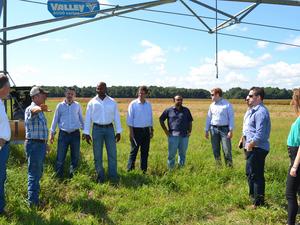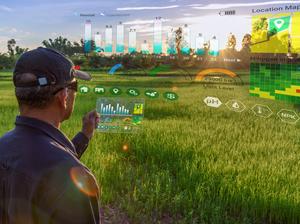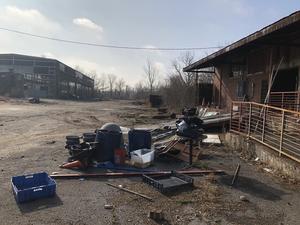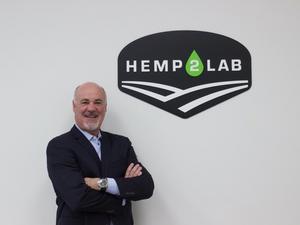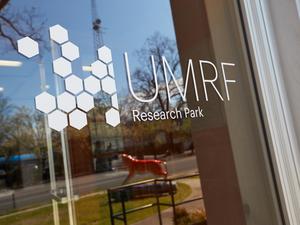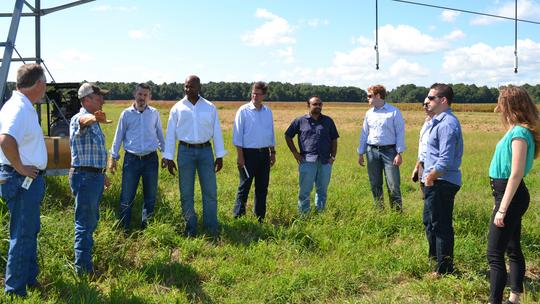
Ask Pete Nelson, executive director of AgLaunch, and he’ll tell you the nonprofit’s latest grant isn’t the largest one it’s ever received — but he’s not scoffing at the size of the award either.
“I’m pretty thankful, and amazed,” he said. “This is a highly competitive grant.”
The local group — which grows ag tech startups and works to develop new agricultural solutions — is a recipient of the Economic Development Administration’s (EDA) SPRINT Challenge, an initiative that hopes to use entrepreneurship and innovation to address the economic, health, and safety risks caused by the COVID-19 pandemic.
Out of 238 applicants, the EDA — a bureau within the U.S. Chamber of Commerce — selected 44 awardees, and each will receive a chunk of a $29 million pie. For AgLaunch, this is $750,000 (the maximum amount). It’s also set to receive an additional $190,000 in matching funds, with $125,000 coming from the Tennessee Department of Agriculture, and another $65,000 from the Iowa-based Ag Ventures Alliance.
“The purpose of the grant, first and foremost, is: How do we pour gas on the things we’re already doing, to really accelerate the efforts,” Nelson said.
So, what’s AgLaunch already doing, and what are these efforts?
A major objective for the organization is bringing more specialty crops — think fruits, vegetables, and nuts — to the Mid-South and Mid-Mississippi Delta, where farmland is dominated by row crops (mass-produced products such as soybeans).
According to Nelson, shifting just 10% of row crops in the area to specialty crops could be a boon for the local economy, bringing substantially more lucrative opportunities to Mid-South farmers. And as a report from the World Wildlife Fund (WWF) shows, it could also provide a supply alternative to California — the country’s primary producer of specialty crops — where water shortages and the climate crises are putting an increasing strain on its farming ecosystem.
The shift to specialty crops isn’t done overnight, however, and there are a handful of barriers that stand in the way of growing them on a larger scale.
So, through the Resilient AgriFood Innovation Network (RAIN) — the name of AgLaunch’s project that received funding — Nelson and co. will chip away at these roadblocks, with funds from the grant. Right now, the project has three areas of focus.
One has been dubbed “the farmer’s toolbox,” which will help AgLaunch’s network of farmers more affectively share data and communicate with each other.
“They’ll be plugged into, basically, each other,” Nelson said. “They can go, ‘Hey, let’s build a market around this kind of crop, or this kind of innovation, or you have a tractor, let’s use it over here,’ to accelerate that network of early adopter farmers [of specialty crops] to communicate, and really interact.”
The second area places an emphasis on robotics and technology — it’s called the Farm Robot Challenge — and could address one of the major barriers that holds back specialty crop adoption: the lack of labor.
Planting and harvesting specialty crops are extremely labor intensive activities, and often don't compensate well. It would be better, Nelson explained, to have equipment that takes care of this work, and creates employment opportunities for people in other parts of the industry.
“We’re planning on going out and recruiting robotics companies from the Carnegie Mellons, from Israel, from other places, anywhere that wants to get into U.S. agriculture, and in particular, work with specialty crops,” he said. “And if we replace folks in the field, the opportunity to get them in other parts of the industry are still there.”
The third goal for AgLaunch is to generate more discussion with existing food manufacturers that operate in Memphis, and receive more feedback: What kinds of products do they need from farmers to create healthy food? What can they grow, that they’re not growing already?
If everything goes according to plan, the company shouldn’t have to wait long to see results from the grant, as in a year, things could start to take shape.
“Next summer, what should happen, is that we’ll see some really strong diverse crop pilots in the field, with some of these automation robotic companies coming here, and much more activity from the food companies,” Nelson said.
